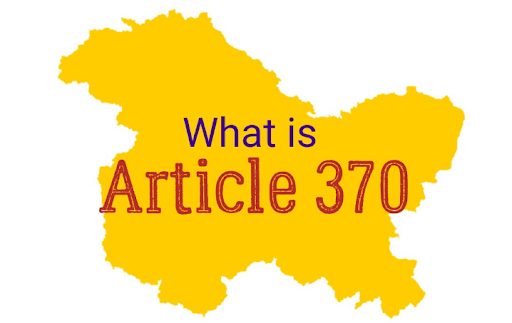What is section 370?
Today home minister presented a bill about dhara 370 in RS of India. What is it?
Article 370 of the Indian Constitution gives special status to the state of Jammu and Kashmir. Article 370 is a special Article of the Indian Constitution, which gives Jammu and Kashmir special rights over other states in India. Article 370 of Part 21 relating to temporary, transitional and special provisions in the Indian Constitution was prepared with the special intervention of Jawaharlal Nehru.
How did India merge?
At the time of Partition in 1947, when the process of incorporating Jammu and Kashmir into the Indian Union started, King Harisingh of Jammu and Kashmir wanted to remain independent. In the meantime, Pakistan-supported tribesmen attacked there, after which they agreed to merge with India.
What special rights does Jammu and Kashmir have
– According to the provisions of Article 370, Parliament has the right to make laws concerning Jammu, Kashmir, about foreign affairs and communication.
– The Center has to get the consent of the state government to implement the law related to any other subject.
– Article 356 of the Constitution on the State of Jammu and Kashmir is not applicable due to this special status. The President does not have the right to sack the state’s constitution.
The Urban Land Law of 1976 also does not apply to Jammu and Kashmir.
– People from other states of India cannot buy land in Jammu and Kashmir. Under section 370, the Indian citizen has the right to buy land in any of the states other than those who have special rights.
– Section 360 of the Indian Constitution, which imposes a financial emergency in the country, does not apply to Jammu and Kashmir.
Merging Jammu and Kashmir into India was a great need at that time. At that time the people of Jammu and Kashmir were given some special rights under Section 370 to carry out this task. Due to this, this state is different from other states of India.
Big things about Article 370
– The flag of Jammu and Kashmir is different.
– The citizens of Jammu and Kashmir have dual citizenship.
– In Jammu and Kashmir, insulting the national flag or national symbols of India is not a crime. Here the orders of the Supreme Court of India are not valid.
If a woman from Jammu and Kashmir marry a person from another state of India then that woman will end her citizenship of Jammu and Kashmir.
– If a Kashmiri woman marries someone from Pakistan, then her husband also gets citizenship of Jammu and Kashmir.
– Pakistanis living in Kashmir due to Article 370 also get Indian citizenship.
– Outside people cannot buy land in Jammu and Kashmir.
The term of the Legislative Assembly of Jammu and Kashmir is 6 years. Whereas the legislatures of other states of India have a term of 5 years.
– The Parliament of India can legislate with respect to Jammu and Kashmir within a very limited scope.
– Sharia law is applicable to women in Jammu and Kashmir.
– Panchayat has no authority in Jammu and Kashmir.
– Right to Information (RTI) does not apply in Jammu and Kashmir due to Section 370.
– Right to Education (RTE) in Jammu and Kashmir does not apply. CAG is also not applicable here.
– Even the peon working in Jammu and Kashmir gets a salary of only two and a half thousand rupees.
Minority Hindus and Sikhs do not get 16 per cent reservation in Kashmir.

